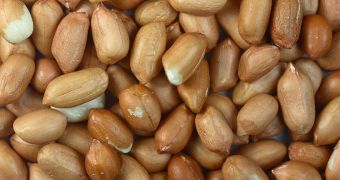Researchers in the United Kingdom announce that they have produced a new treatment against peanut allergies, that apparently is capable of counteracting the condition's effects. The team is based at the University of Cambridge.
According to a new study accompanying the announcement, these results were obtained following a three-year trial study, in which subjects showed remarkable sings of improvement with their allergies.
The investigation was conducted specifically on people committed to Addenbrooke's Hospital with severe peanut allergies. All of them were fed a carefully developed regime containing chocolate that was made using peanut flour.
Increasingly large doses were administered to patients, who responded favorably to the treatment. The research was led by Cambridge Department of Medicine expert Dr Pamela Ewan and her study group.
A smaller clinical trial had been conducted previously, in 2009, and the results were the same. However, the group decided to carry out the new trials as well, on 22 children who reacted allergically to even the smallest traces of peanuts in the stuff they ate.
After the trial period had concluded, 19 of the children were able to eat as much as 5 peanuts per day without experiencing any reaction. Two of the original batch registered partial successes, in the sense that they could only eat 2-3 peanuts per day. One of the children had dropped out in the mean time.
“This is the first time that a peanut allergy study has shown such a high level of success and proves that it is possible for peanut allergic patients to eat peanuts without fear of a severe reaction,” explains the leader of the trials, Dr. Andrew Clark.
He adds that, six months after the treatment had been completed, the children were still able to consume peanuts in the aforementioned amounts without experiencing allergic reactions. The effectiveness of the desensitization treatment therefore lasts over prolonged periods of time.
“The lives of the families involved in this trial have been transformed. The amount of peanut that could be tolerated by the children and teenagers on this trial increased 1000-fold,” Dr. Clark emphasizes.
Allergies of this sort influence the lifestyle of patients' families as well, researchers say, because the fear of a reaction is dictating all choices in the household that are related to food. Now that the kids can consume relatively large amounts of the stuff, things are bound to improve.
For example, parents may no longer have to avoid buying products that only contain trace amounts of peanuts. This could contribute to a diversity in foods that family members are likely to embrace.
“This treatment could drastically improve the lives of those currently suffering with severe peanut allergies. We are currently looking to make this groundbreaking treatment more widely available,” says Dr. Maher Khaled.
The expert works for the university's commercialization group, called Cambridge Enterprise.
Details of the new investigation, which was supported by the National Institute for Health Research and the Evelyn Trust, were published in the March 18 issue of the medical journal Clinical and Experimental Allergy.

 14 DAY TRIAL //
14 DAY TRIAL //